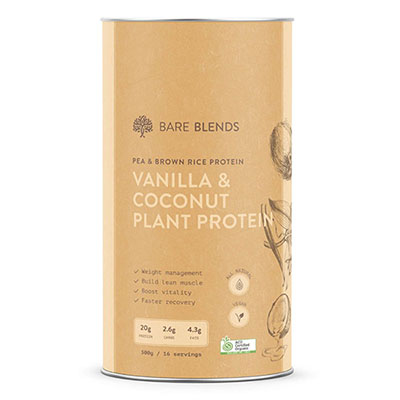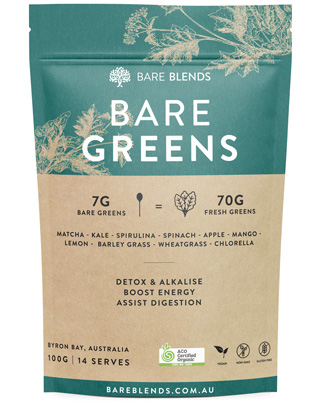Vegan Nutrition Part 1: Fake Meat And Things To Avoid
Unfortunately many vegan products on the market, especially meat alternatives, are made with very questionable ingredients.

Bare Blends
2020-03-19

There is a common understanding that vegan food is healthy, or that it’s predominantly made with only vegetables and plants. Unfortunately, many vegan products on the market, especially meat alternatives, are made with questionable ingredients.
While we know that there are some healthy vegan products available (the ones that celebrate whole foods) the majority of vegan products are so heavily processed that they are nutritionally equivalent to junk food, and often contain high amounts of sodium.
These processed products are trending. Meat-like burgers and chicken nugget alternatives that you’ve seen on your supermarket shelves are just the beginning. Fast-food chains, restaurants and burger shops across the world have adapted to the expanding vegan market with vegan burgers and imitation meat products.
With these meat alternatives growing in popularity, we asked the question that nobody else seemed to - what is actually in these products, and how do they affect our health? We took a closer look at these ingredients to discern their nutritional value.

Common ingredients to avoid
Soy protein
Soybeans can be processed into flour and texturised proteins, so it is an easy addition to vegan products, particularly meat alternatives. Soy proteins are very heavily processed - typically defatted soy flours or concentrates that are mechanically processed and extracted to obtain chewy meat-like textures when rehydrated and cooked. The downsides of soy protein are that it contains high levels of isoflavones, which are the bioactive compounds known to increase estrogen in both females and males, and has the potential to inhibit testosterone when consumed in large amounts.
Soybeans also contain anti-nutrients such as tannins, phytates and trypsin inhibitors which can interfere with our digestion and absorption of nutrients. Although the processing methods that soy products go through reduces most of these anti-nutrients, the high levels are still a concern.

Image: examine.com
Mycoprotein
Mycoprotein is a fungus that’s typically found in soil, but is produced commercially by growing the fungus in a liquid solution in large vats. It's essentially similar to growing mould, and ingredients such as glucose, fixed nitrogen, and vitamins and minerals are added before it’s heat processed. Currently, there is conflicting research about the safety of products made with mycoprotein.
There are studies that report mycoprotein can cause severe allergic reaction, so it’s clear that more research is warranted to determine the side effects, both short and long term.
Natural flavours
It is important to be wary of the addition of ‘flavours’ in the ingredients list. The definition of ‘natural flavours' allows for the substances to be extracted from plant or animal matter, so although the terms ‘natural’, ‘organic’, ‘vegetarian’ or ‘vegan’ may appear on the packaging, there is no guarantee an animal/animal part wasn’t used in the production of a ‘natural’ flavour.
Natural flavours are heavily processed and can contain many chemical additives. As such, natural flavours aren’t all that different to artificial flavours in terms of chemical composition and subsequent effects on our health.
Well-planned vegan diets can certainly contain all of the nutrients needed for good health. Although it is a good idea to consult your professional and use supplements if needed, as nutrient deficiencies are very common. As for meat replacements, we recommend sticking to whole, unprocessed foods rather than the processed ‘fake meat’ alternatives.
We celebrate healthy vegan protein sources and which nutrients to include in our next post: Vegan Nutrition Part 2: Essential Nutrients, And What To Supplement - published soon.
Recommended products

Vanilla & Coconut Plant Protein
- Golden pea and sprouted rice protein
- Australian certified organic
- Over 19g of plant-based protein per serving
Bare Greens
- Freeze-dried organic greens and vegetables
- Detoxifying & alkalising
- An energy-boost without the crash

References:
https://examine.com/nutrition/is-soy-good-or-bad/
https://www.ncbi.nlm.nih.gov/pmc/articles/PMC5188422/


